Traveling the Unknown: Part I
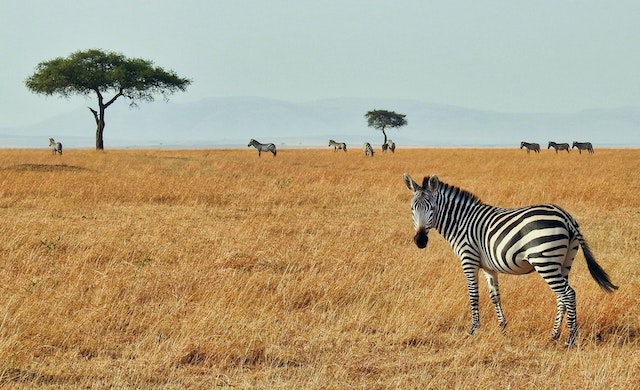
A Journey to Kenya
This is the first part of a two-part series.
People travel for a reason. They don’t just open their suitcase or backpack, throw in socks and a hairdryer and get going, into another world. They usually follow a call, a question, and this is what separates each journey from the other. Or it is what links all of them like the beads in a rosary and brings you back to the same prayer, the same place within yourself however far and often you go.
So if you follow me on these tours to East and South Africa, it will be your journey. You don’t have to get me right, to worry whether you understand correctly why I’m taking this turn or that decision. When my thoughts wander off, even farther than our feet, you may question or disbelieve them. Take these travels as yours and whatever you see, or miss, or shiver from—it’s probably there; it’s what you add to my adventure. It is your trip.
I – Northbound
The one thing you want to make sure is not to arrive after dark. If you haven’t booked a hotel beforehand—and my friend T. and I hadn’t, as usual—you’ll be in trouble then. It’s fine to walk around in daylight, checking lodges and negotiating with family hotel owners throughout the place, but nobody does so in the dark.
Malindi, two hours north of Mombasa. We traveled there to visit a tribe that still performs traditional wind instruments, a field T. was researching, back then in 2005, for her habilitation thesis. I had joined her because I love to discover places from a less touristy point of view, with a purpose beyond sightseeing, from the perspective of people living and working there. We had no idea what Malindi would look like and whether it was a tourist spot. But we knew how Kenya worked and had been warned by our friends in Nairobi; and thus we started out early from Mombasa. Well, early or what we thought was early—somewhat around noon. It would get dark at about six; this would give us at least three hours (traffic jam and other delays included) to find a place to stay overnight.
I had heard how dangerous Kenya could be, I had read it in the eyes of our friends in Nairobi and of the woman on the bus to Malindi.
We should have known better. My friend is Ethiopian, and Kenya was the fifth stop on her half-year journey through six East African countries, recording and photographing traditional instruments, interviewing and watching people make flutes and whistles from grass, cane, or wood. We had spent a whole afternoon on a beach near Mombasa with a boy who plaited two tiny pipes from a kind of reed for her and showed us how to play them. His long fingers had split and interlaced the leaves carefully, clasped the green cone with a stick, and laid it solemnly between two sand ripples on the beach, proud and at the same time wondering about my friend’s concentrated attention for a small green thing that would be withered tomorrow and he could recreate the next day. Time has a different weight here, may it be centuries of musical traditions or the half-hour needed to make a pipe that turned into a whole afternoon, all by itself… You’ll see it yourself as you try to get on to the following paragraph, the next stop on the road, and find us still sitting there at the beach.
While T. took pictures, bowing, then kneeling down, zooming in at every detail of the tiny cone, I had asked the boy about malaria and how they dealt with it.
You certainly can’t take the side-effect-laden preventive medication I carried with me for longer than a few weeks.
I don’t do anything, he’d said.
And if you get it?
I go to the hospital and get treatment.
It sounded like well-known talk about the flu to me; and indeed, I’ve heard that thousands of people in Europe actually die from the flu each year. Not so different after all, you could say. Do we misjudge the danger we’re used to or do we just overestimate what’s unknown?
One night, we had heard a fight at the gas station one block down the road and later someone’s cry for help; but nobody in the whole building would dare to open a door or even call the police.
As if to correct my half-knowledge based on one case, a man boarded our bus somewhere halfway to Malindi and gave a long speech in Kiswahili of which I didn’t understand much except for the fact that he was trying to sell something. He held up a little bottle; and T. found out (asking a woman sitting in front of us) that his sermon was about malaria and the necessity to take precautions. About how dangerous it was and how you should protect yourself. In Kenya, a lot of political, social, and commercial information takes place in the open air—once I watched a street theater show in our Nairobi neighborhood that turned out to be an ad for laundry detergent. And still, this man’s persuasion effort on the bus didn’t seem so far from the leaflets you see in Europe each year when the flu season draws near.
We, however, were not drawing any nearer to Malindi, it seemed, even though two hours had long passed. Or three or four… I don’t really recall when we started to stare at our watches. There is no long dusk period in Kenya, near the equator; dark falls when it’s time to silence the markets and shores, and it lifts its head and feet the next morning, rolls up its scarab blue cover and mattress, and disappears behind the roofs, swift and soundless as if there had never been anything else but bright day.
I tried to scan the Malindi pages in T.’s guidebook, but it was already too dim to read. For a while, we didn’t dare to speak, as if we hoped to hush the dark. I recalled muffled nighttime encounters under the window of our friends’ place in Nairobi. One night, we had heard a fight at the gas station one block down the road and later someone’s cry for help; but nobody in the whole building would dare to open a door or even call the police. They might have already been there, in fact… Eastleigh was certainly not a neighborhood in which to go out at night—or anytime if I believed our friends who ran an Ethiopian restaurant there that was open from morning to afternoon.
It was a shack, but the food was great, and I went there for lunch daily, mostly (as they couldn’t always send someone to pick me up) going by myself, pressing my red handbag against my chest and putting on my most self-assured face—staring down on the ground, climbing carefully over hardened sand heaps, between dozens of plastic bags flying up in the hot breeze. By then they hadn’t told me yet I should take off my earrings so nobody could rip them off my ears; and I made it all the way to their fluffy injera (a teff pancake that serves as dish and main ingredient of Ethiopian food) covered with spicy or mild lentil and meat stews. They brought me strong coffee, buna, after the meal, and smiled, and told me again not to come here alone. And when T. and I left Nairobi for our one-week trip to Mombasa and further north along the coast, they warned us to take care to arrive at all destinations by daylight, no matter what.
Today, however, we wouldn’t make it. We started whispering, discussing options. How could we find a hotel in the dark that was decent, not too pricy, and safe? T. leaned forward to the woman in front of her and asked if she knew where the bus would stop in Malindi and how to get to the center from there. The woman turned around, her eyes wide open: You don’t have accommodation yet? We could see her scan the town in her mind, trying to think of something; and we sat back in our seats and tried the same: planning our first, crucial steps upon arrival in Malindi.
The bus stopped, and we climbed out, hesitantly. A small shop in front of us, painted light blue from the walls to the ceiling, was the first thing we saw. Here we would ask. People rushed around us to find and pull their bags out of the luggage compartments left and right of the bus. A tuk-tuk, a three-wheel micro-taxi, stopped at our feet, and the driver offered to bring us to a good hotel. We tried to ask for more information, but people pushed their way between and around us, shouting and shoving their bags to the sidewalk. Somebody grabbed T.’s elbow—the woman who had sat in front of us, and who we thought was already gone, stood suddenly behind us, holding T.’s arm, and said: You wait here. Don’t move.
We entered the light blue emptiness of the shop and prepared ourselves to wait.
But it took only a few minutes for the woman to return with another tuk-tuk, seating us in, and giving the driver instructions. We didn’t understand a word; I had learned to say Hi and to count to ten in Kiswahili, T. spoke a little more, but we were far from getting around without English.
Take care. — This was for us. The woman continued. Don’t walk in the dark. Enjoy your time in Malindi. Bye bye, good night, and—
The tuk-tuk started off with astounding speed, and we couldn’t hear her final warnings. She had already turned and hurried on her way.
The tuk-tuk bounced through the streets for what felt like more than half an hour. Again, we didn’t speak, the dark sat left and right of us and had laid out its cover in front of the tuk-tuk, despite its small headlight. I couldn’t discern the slightest silhouette, houses in town or trees and bushes along a dirt road into the jungle. I leaned forward and held on to the armrest, but I was only shaken more strongly, so I let myself fall back into the seat.
We arrived at a building so black against the dark blue sky that we couldn’t even make out its size. But when we entered, there was a small restaurant filled with Kenyans and Europeans; and we recognized a mixed couple (a tourist and a Kenyan) we had met before at a lodge near Mombasa. Our room upstairs was small, but perfect with a mosquito net over one of the canopy beds you find in many hotels in Kenya. Exhausted with relief, we fell onto our sheets.
Waking up the next morning, the light was so strong that I couldn’t imagine how this place had been dark and invisible the night before. Our window opened to a small bay with brown sand on the other side of the road, with a couple of fishing boats resting on the grass, long shadows still sleeping between them in the early sun. The opposite window looked over the roofs of the town; yellow, orange, and white walls and doors peeked at us out of narrow streets, ready for market, and work, for children to walk to school, and for our trip out of town to the tribe we were here to see.
What we deem exquisite may be quite ordinary in other parts of the world.
I ate my first lobster in the little restaurant beneath our room, for the price of a simple pasta dish at home and not even very expensive for Kenya. It was scrumptious. Lobster was actually what I had imagined to be part of a romantic dinner in a fancy Western restaurant one day, a dinner that I would be invited to, of course (and that might involve even more precious moments). I didn’t expect to ever order lobster for a regular meal and for myself (T. didn’t care for seafood and had something different). And I certainly didn’t expect to find lobster on the menu of a small local restaurant at Kenya’s coast.
What we deem exquisite may be quite ordinary in other parts of the world—and most surprisingly, this works both ways, despite all the serious worldwide disparities. Immersing myself into discoveries such as these, I feel myself change. I don’t need the fancy dinner anymore (even if I might still want the ring on my greasy finger), and once again, I remember the greatest luxury of all: to see the Indian Ocean from a new angle, to have mastered my fear again, to observe and meet people who make this part of the world livable, lovely, and exciting.
Maybe this is what I travel for. But truly, I don’t know. I may find out and describe why I choose a certain destination, but I can’t explain why I travel in the first place—much like I can tell you what food and tea I like, but cannot give you a more sophisticated reason for why I eat than that I’m hungry. I assume it’s like this for many “travel addicts.” It’s the same urge, something unknown within me that wants to try Belgian chocolate and yellow tea from (or even better in) Singapore and that makes me go and see the ends of the earth, the ways people live there and cultivate it.
Outside Malindi, I saw flutes and drums made by a hidden tribe nearby in the forest, the wood carved with precision and the drum leather as well as the flutes finished by fire. Yes, there is no genuine music, no way of discovering the inner parts of the world and yourself without fire, without getting right into it and burning your fingers a little. I had heard how dangerous Kenya could be, I had read it in the eyes of our friends in Nairobi and of the woman on the bus to Malindi. But what I saw happening was something else: the permanent shadow of crime over their cities and lives made people more caring, watching over one another. They warned us and themselves and they went out of their way to create safety for us within their anxiety. The one thing you want to make sure then is to trust these people and to go try injera in a small barrack in Nairobi’s refugee district or the filled lobster in a Malindi restaurant that you can only find in the dark.
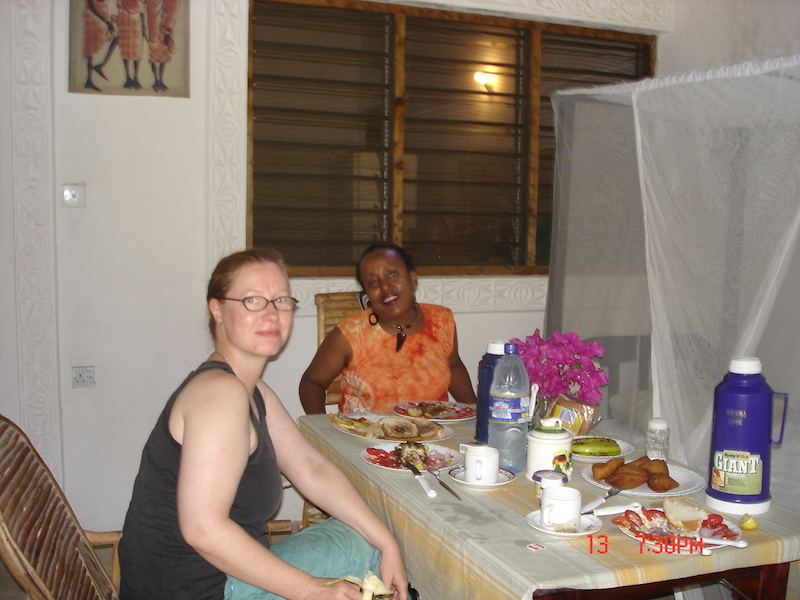
Read the second part of Britta’s essay here.
Top image by Unsplash.

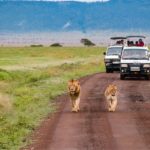


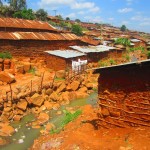
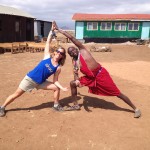


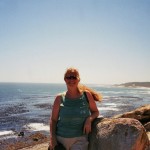
Hallo liebe Britta,
wie geht es Dir in Israel? Wie hat es Dich denn dahin verschlagen und was machst Du dort außer interessante Blogs schreiben… ich finde es spannend was Du schreibst und finde es mutig von Dir, dass Du Deinen RAA Job gekündigt hast um etwas Neues zu beginnen! Klasse!
Würde mich freuen von Dir zu hören
Liebe Grüße aus dem grauen Berlin…von Birgit Funke
The most vivid travelogue that I’ve ever had the pleasure of reading. You expressed your thoughts and captured the mood perfectly. Well done!